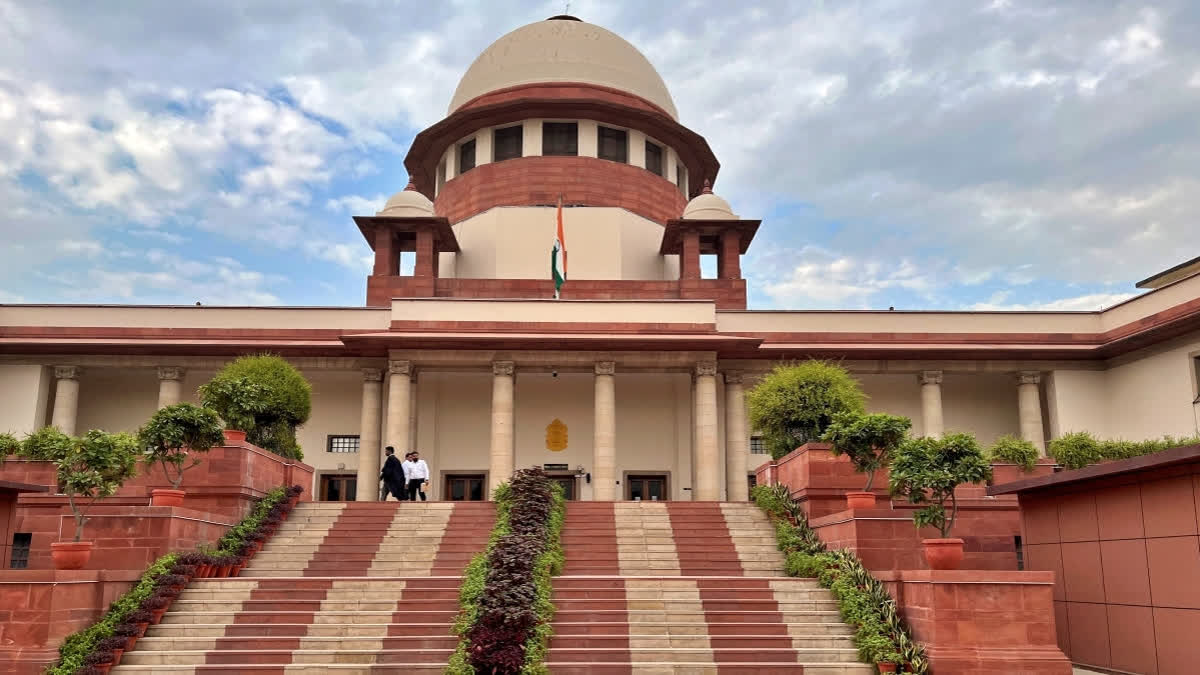New Delhi:The Supreme Court has said that policy making is not in the domain of the judiciary and an Armed Forces Tribunal cannot direct those responsible for making policy, to make a policy in a particular manner.
The apex court stressed that a court in writ jurisdiction is often faced with situations that allegedly fly in the face of fundamental rights, and yet, it has not been entrusted with the power to direct such formation of policy.
A bench comprising justices Abhay S. Oka and Sanjay Karol said that making policy, as is well recognised, is not in the domain of the judiciary and the tribunal is also a quasi-judicial body, functioning within the parameters set out in the governing legislation. “Although, it cannot be questioned that disputes in respect of promotions and/or filling up of vacancies is within the jurisdiction of the tribunal, it cannot direct those responsible for making policy, to make a policy in a particular manner”, said the bench, in a judgment delivered on December 14.
Justice Karol, who authored the judgment on behalf of the bench, stressed that it has been observed time and again that a court cannot direct for a legislation or a policy to be made.
Citing the apex court’s judgment in Union of India vs Ilmo Devi and others (2021), the bench said that it only stands to reason that a tribunal functioning within the strict boundaries of the governing legislation, would not have the power to direct the formation of a policy. “After all, a court in writ jurisdiction is often faced with situations that allegedly fly in the face of fundamental rights, and yet, has not been entrusted with the power to direct such formation of policy”, said the bench.
The bench said that a tribunal subject to the high court’s jurisdiction under Article 226, cannot be permitted by law, to direct the framing of policy by the government.
The apex court made these observations in a civil appeal, under Section 31(1) of the Armed Forces Tribunal Act, 2007, filed by Union of India, against the judgment and order dated November 30, 2015, passed by the Armed Forces Tribunal (AFT), principal bench, New Delhi.
Respondent Air Commodore N K Sharma, was commissioned in the administrative branch of the Indian Air Force on December 29, 1982. In 1989, he voluntarily underwent training for the Air Force Judge Advocate course in accordance with Air Force instruction issued by the government of India titled as ‘Employment of Air Force Officers on Legal Duties-Terms and Conditions’ which he completed in 1990.
The bench noted that from 1991 onwards, Sharma served in the JAG (Judge Advocate General) department. On June 1, 2011 he was promoted to the rank of Air Commodore. Further, he was granted the acting rank to fill up the possession of JAG (Air). He continued to serve in this position till 15 April 2013. In the meanwhile, on 4th May, 2012 the post of JAG (Air) was upgraded to the rank of Air Vice Marshal. On 15 April 2013 another officer of the upgraded rank was appointed to serve as JAG (Air). The grievance of the respondent is that upon superannuation of the previous JAG (Air), despite meeting the criteria for promotion to AVM, no promotion board was formed to consider him for the vacancy and instead, it was eventually decided that he would be considered for promotion in his parent branch along with his course mates in promotion board 1/2015.
The apex court quashed and set aside an order by the AFT directing the Centre to permit Sharma to function as JAG (Air) till such time that the formulation of a policy for filling up the possession of AVM (Air Vice Marshal) takes place, and giving him an opportunity to be considered under such a policy.
The apex court said: “we are of the view that the respondent’s challenge was barred at first instance, as he participated in the Promotion Board of 2015 and only challenged the non-formation of a policy for filling up the vacancy of AVM JAG (Air), finding himself to be unsuccessful in securing a promotion thereto”.
The counsel, representing the Centre, contended that the tribunal was not justified in directing that Sharma be allowed to function as JAG (Air) till such time that the formulation of a policy for filling up the possession of AVM takes place, and he’s given an opportunity to be considered under such policy. “Such a direction, it is submitted, is against public policy as it would allow the Respondent to continue in service beyond the age of superannuation, 57 years. He was due to retire from service on 30 November 2015”, said Centre’s counsel.
The Centre’s counsel stressed that the tribunal could not direct that a person should be considered for promotion in a particular manner or in terms of a new policy, framed upon such direction.
The apex court noted that it is undisputed that the respondent participated in the promotion board of 2015 and it is only when after such consideration alongside other course-mates of the adm. branch, when he was not promoted to the rank of AVM JAG (Air) that he initiated the statutory complaint under Section 27 of the AF Act dated 20 April 2015.
“Challenging the basis of promotion after having participated in the process on consideration of promotion and having been declared unsuccessful thereunder, is not a valid ground to impugn the policy/method. Repeatedly, this Court has held that such challenges cannot be allowed”, said the apex court.
Also read:
- SC disposed of 52,191, cases in 2023, 18,449 criminal and 10,348 civil matters
- "Failure to pay son’s tuition fees," SC seeks personal appearance of US man for not complying its order
